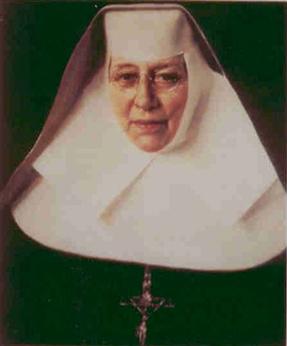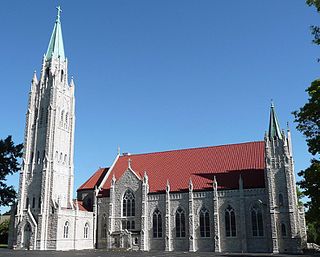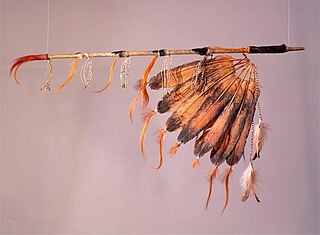
Calumet County is a county located in the U.S. state of Wisconsin. As of the 2020 census, the population was 52,442. The county seat is Chilton. The county was created in 1836 and organized in 1850.

Jacques Marquette, S.J., sometimes known as Père Marquette or James Marquette, was a French Jesuit missionary who founded Michigan's first European settlement, Sault Sainte Marie, and later founded Saint Ignace. In 1673, Marquette, with Louis Jolliet, an explorer born near Quebec City, was the first European to explore and map the northern portion of the Mississippi River Valley.

Irenaeus Frederic Baraga was a Slovenian Catholic missionary to the United States, grammarian and author of Christian poetry and hymns in Native American languages. He was the first Bishop of Sault Sainte Marie and Marquette, a post he held for 15 years.

Katharine Drexel, Founder of the Sisters of the Blessed Sacrament (SBS) Katherine Drexel was an American Catholic religious sister, and educator. In 1891, she founded the Sisters of the Blessed Sacrament, a religious congregation serving Black and Indigenous Americans.

The Rosebud Indian Reservation is an Indian reservation in South Dakota, United States. It is the home of the federally recognized Rosebud Sioux Tribe, who are Sicangu, a band of Lakota people. The Lakota name Sicangu Oyate translates as the "Burnt Thigh Nation", also known by the French term, the Brulé Sioux.

The Archdiocese of Kansas City in Kansas is a Latin Church ecclesiastical province, or archdiocese, of the Catholic Church in eastern Kansas in the United States.
The Bureau of Catholic Indian Missions is a Roman Catholic institution created in 1874 by J. Roosevelt Bayley, Archbishop of Baltimore, for the protection and promotion of Catholic mission interests among Native Americans in the United States. It is currently one of the three constituent members of the Black and Indian Mission Office.

Henry George Teigan was an American labor leader and editor who served as a member of the United States House of Representatives from Minnesota.
Wisconsin's 6th congressional district is a congressional district of the United States House of Representatives in eastern Wisconsin. It is based in the rural, suburban and exurban communities between Madison, Milwaukee, and Green Bay. It also includes the village of River Hills in far northern Milwaukee County. The district is currently represented by Glenn Grothman (R-Glenbeaulah) who took office in January 2015.

Native American tribes in the U.S. state of Nebraska have been Plains Indians, descendants of succeeding cultures of indigenous peoples who have occupied the area for thousands of years. More than 15 historic tribes have been identified as having lived in, hunted in, or otherwise occupied territory within the current state boundaries.

The Winnebago Reservation of the Winnebago Tribe of Nebraska is located in the U.S. in Thurston County, Nebraska, United States. The tribal council offices are located in the town of Winnebago. The villages of Emerson, south of First Street, as well as Thurston, are also located on the reservation. The reservation occupies northern Thurston County, Nebraska, as well as southeastern Dixon County and Woodbury County, Iowa, and a small plot of off-reservation land of southern Craig Township in Burt County, Nebraska. The other federally recognized Winnebago tribe is the Ho-Chunk Nation of Wisconsin.

Menominee was a Potawatomi chief and religious leader whose village on reservation lands at Twin Lakes, 5 miles (8.0 km) southwest of Plymouth in present-day Marshall County, Indiana, became the gathering place for the Potawatomi who refused to remove from their Indiana reservation lands in 1838. Their primary settlements were at present day Myers Lake and Cook Lake. Although Menominee's name and mark appear on several land cession treaties, including the Treaty of St. Mary's (1818), the Treaty of Mississinewas (1826), the Treaty of Tippecanoe (1832), and a treaty signed on December 16, 1834, he and other Potawatomi refused to take part in subsequent land cession negotiations, including the Treaty of Yellow River (1836), that directly led to the forced removal of Menominee's band from Indiana in 1838.
Eugene Buechel was born on October 20, 1874, in Schleida, now Schleid, in the Grand Duchy of Saxe-Weimar-Eisenach, Germany, and died October 27, 1954, in O'Neill, Nebraska, United States. Buechel was a Jesuit priest and missionary, linguist and anthropologist among the Brulé or Sicangu Lakota or Sioux on the Rosebud Indian Reservation and the related Oglala Lakota or Sioux on the Pine Ridge Indian Reservation in South Dakota.

A ceremonial pipe is a particular type of smoking pipe, used by a number of cultures of the indigenous peoples of the Americas in their sacred ceremonies. Traditionally they are used to offer prayers in a religious ceremony, to make a ceremonial commitment, or to seal a covenant or treaty. The pipe ceremony may be a component of a larger ceremony, or held as a sacred ceremony in and of itself. Indigenous peoples of the Americas who use ceremonial pipes have names for them in each culture's Indigenous language. Not all cultures have pipe traditions, and there is no single word for all ceremonial pipes across the hundreds of diverse Native American languages.

Red Cloud Indian School is a private, Catholic, K–12 school run by the Jesuits in Oglala Lakota County, South Dakota. It is located in the Diocese of Rapid City and serves Oglala Lakota Native American children on the Pine Ridge Indian Reservation.
St. Joseph's Indian School is an American Indian boarding school, run by the Congregation of the Priests of the Sacred Heart just outside the city of Chamberlain, South Dakota, on the east side of the Missouri River. The school, located in the Roman Catholic Diocese of Sioux Falls and named after Saint Joseph, is operated by a religious institute of pontifical right that is independent of the diocese. The school is within two hours of three reservations of the Lakota people: the Cheyenne River Indian Reservation, the Lower Brule Indian Reservation and the Crow Creek Indian Reservation, whose children comprise the majority of students at the school. The Akta Lakota Museum and Cultural Center is located on the campus and is owned by the school.

St. Francis Mission is a Roman Catholic mission complex on the Rosebud Indian Reservation in St. Francis, South Dakota, in territory of the Lakota (Sioux) Native Americans. The mission was founded in 1886 by priests of the Society of Jesus (Jesuits), who were welcomed by Bishop Martin Marty of the Diocese of Saint Cloud, Minnesota, which extended to this territory at the time. The Jesuit order soon developed a large complex to serve the Lakota at this reservation. Most of the buildings were destroyed by a fire in 1916, but many were soon rebuilt.
Philip Bergin Gordon (Dibishkoo-Giizhig) Chippewa ("Ojibwe') was the second American Indian Catholic priest ordained in the United States. The first was Albert Negahnquet, a Potawatomi, in Oklahoma. A staunch advocate for Native American rights, critical of the Bureau of Indian Affairs, he was President of the Society of American Indians and also served on the "Committee of One Hundred" for U.S. president Calvin Coolidge. Following service at the Lac Courte Oreilles Indian Reservation, Gordon was assigned the pastorate of St. Patrick's Church in Centuria, Wisconsin in 1924, a position he held until his death.
Albert J. Negahnquet ("Leading-Cloud") was the first American Indian Catholic priest in the United States.
Mother Mary Joseph Lynch was the founder of the Native American boarding school that became the University of Minnesota Morris. She was a member of the Catholic order the Sisters of Mercy.













